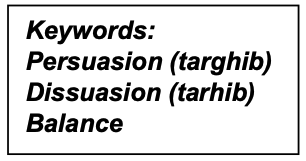

Majlis Ugama Islam Singapura
Khutbah Jumaat
25 April 2025 / 26 Syawal 1446H
Guidance Through the Approach of Targhib (Persuasion) and Tarhib (Dissuasion)

,Dear blessed congregation
Let us continue to strengthen our taqwa towards Allah s.w.t. Obey all His commands, and abstain all His prohibitions. Seek the mercy and love of Allah, and be wary of His wrath. Through this, may we become individuals who are consistently eager to seek His pleasure, and who never despair of His mercy. Amin, ya Rabbal ‘Alamin.
My virtuous brothers,
Please reflect upon the words of Allah in Surah Al-Ma’idah, ayat 98:

Which means: “Know that Allah is severe in punishment, and that Allah is Most-Forgiving, Most Merciful.”
There may be some among us who question: How can Allah be the Most Forgiving and the One whose punishment is most severe at the same time? Are not forgiveness and punishment two matters which oppose one another?
My dear brothers, know that the verses which mention both
Allah’s forgiveness and His punishment are truly a testament to the perfection of His asma’ - names, and His attributes. Through engaging in tadabbur – reflection, we come to witness how the human soul is nurtured through an approach which balances persuasion – (known as targhib) and dissuasion – (known as tarhib).
Beloved Friday congregation,
The Quran contains numerous persuasions for us to continuously pursue the mercy of Allah s.w.t. We are reminded of the vastness of His mercy and compassion which has no limits, motivating us to be steadfast in performing acts of obedience.
At the same time, the Quran also delivers stern dissuasions about the punishment which awaits those who deliberately commit sins without any remorse. This approach is meant to make us more cautious, so that we do not deliberately transgress the limits set by Allah.
Respected brothers,
Why is this approach of both persuasion and dissuasion so appropriate in guiding the human nature? Why must there be both, and not just persuasion, or dissuasion alone?
Picture the analogy of parents striving to raise their child to become a righteous person. If they allow the child to do as he or she pleases, without any form of guidance or reminders, there’s a possibility the child will fail to learn noble character and virtuous conduct.
On the other hand, if the parents are too harsh in their upbringing, only issuing warnings and threats without any encouragement or uplifting words, it will most likely break the child’s spirit.
Such is the approach of persuasion and dissuasion in nurturing the human soul. Persuasion or encouraging words alone, if not accompanied by dissuasions and reminders, may fail to motivate humankind to do good, and it may even lead them towards transgressions, deceived by the assumption that Allah’s mercy is easily attained, even without any sincere effort on their part to earn it.
On the other hand, constant dissuasions and harsh reminders, without any uplifting persuasion to inspire obedience, will only lead a person to despair of Allah’s mercy after falling into a mistake, whether that mistake was intentional or not.
This reflects the balanced nature of Islamic teachings, which emphasise both effort and self-accountability. Those who seek
Allah’s pleasure and mercy must strive towards it. Meanwhile, those who strive to obey Allah’s commands, or who may have transgressed His limits, must take responsibility and be accountable to face the consequences of their deeds.
Both the approaches of persuasion and dissuasion are summarised in a hadith of the Prophet s.a.w. which means:
“If the disbeliever knew of all the mercy that lies with Allah, he would not despair of attaining Paradise. And if the believer knew of the punishment that lies with Allah, he would not feel secure from the Hellfire.” (Al-Bukhari)
Dear Believers,
How can the approach of persuasion and dissuasion help us become better individuals?
Firstly: The approach of persuasion inspires us to actively pursue goodness.
A believer who comprehends the rewards of Allah will be driven to do good. He gives attention to the family, nurtures them with affection, is responsible in carrying out his work, and strives to maintain good ties with others. At the same time, he safeguards his acts of worship and relationship with Allah, and promptly seeks His forgiveness when erred. All this is done with the deep hope of earning the pleasure and love of Allah s.w.t.
Secondly: The approach of dissuasion teaches us to be vigilant in abstaining from transgressions.
A believer who comprehends the consequences of sin will consciously strive to avoid wrongdoing. He does not abandon prayer intentionally, does not tell lies, severe human relations, nor oppress or act unjustly towards others. He understands that Allah’s mercy is attained through the effort that he puts in.
Thirdly: Balancing persuasion and dissuasion to achieve greater good.
In seeking self-improvement and advising family, friends, or the community, a believer must balance the approaches of targhib and tarhib, as mentioned earlier. This balance does not mean applying the same approach to everyone. Rather, it means offering encouragement or warning in a way that suits the context and character of each individual or specific group.
In conclusion, let us adopt a balanced approach in improving ourselves, and in guiding others towards goodness and steering them away from wrongdoings.
Persuasion, when delivered with wisdom and sincerity, has the power to inspire a lasting change. At the same time, dissuasion, when carried out with compassion and kindness, helps establish the necessary boundaries as outlined by our faith.
Dear Muslims,
Let us be steadfast in praying that Allah s.w.t. grants us the strength to remain consistent in safeguarding our deeds and in pursuing acts of obedience. Let us also ask Allah to fulfil our prayers and hopes of attaining His pleasure and love. Amin, ya Rabbal ‘Alamin.

SECOND KHUTBAH



